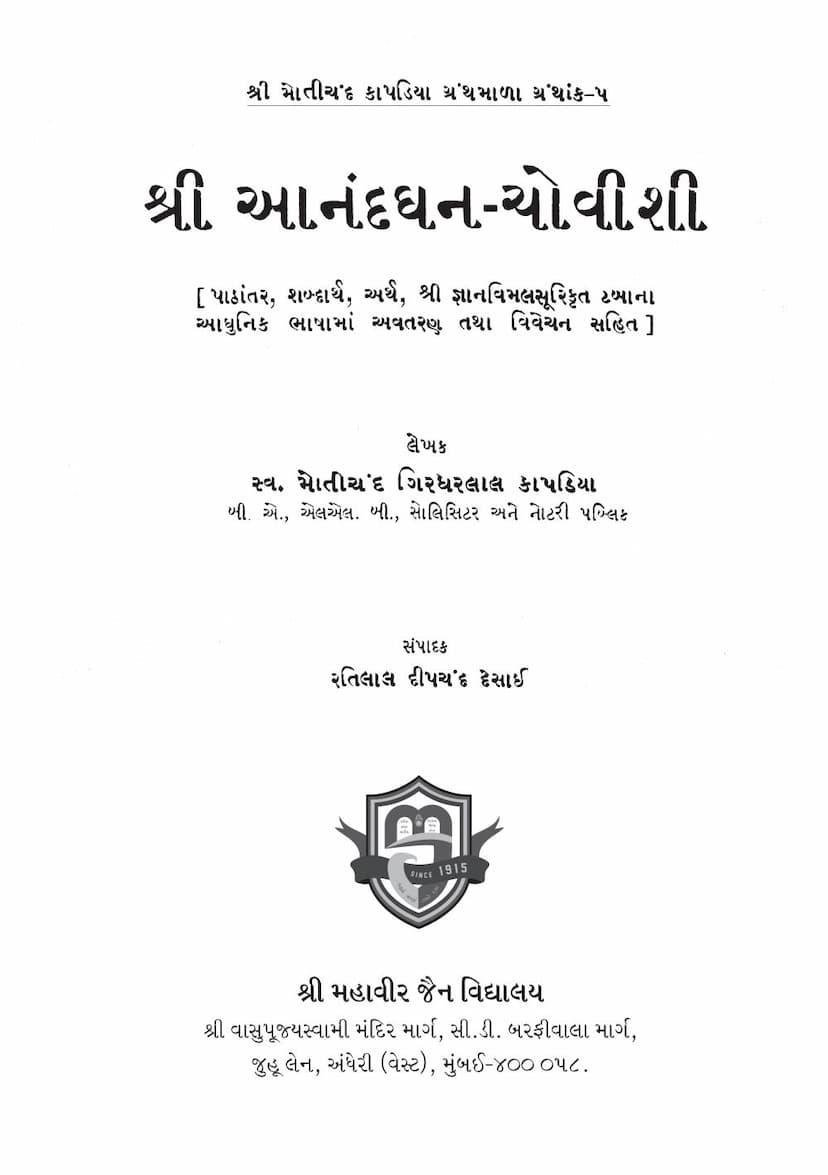Anandghan Chovisi
Added to library: September 1, 2025

Summary
This Jain text, "Anandghan Chovisi," authored by Motichand Girdharlal Kapadia and published by Mahavir Jain Vidyalay, is a collection of devotional poems (stanzas) attributed to the Jain saint Anandghan. The book, compiled and edited by Ratilal Deepchand Desai, aims to provide a deep understanding of Anandghan's philosophical and spiritual verses.
The text is presented in Gujarati, with the title "Shri Anandghan Chovisi." It includes the original verses, their alternate readings (pathantar), word meanings (shabdarth), explanations (arth), and commentary (takha) by Shri Gyanvimal Suri, translated and elaborated in modern language.
The book is structured around stanzas dedicated to the twenty-four Tirthankaras of Jainism, with each stanza offering a detailed analysis. The compiler, Motichand Girdharlal Kapadia, was a respected solicitor and notary public with a deep knowledge of Jain scriptures. His work is praised for making the profound verses of Anandghanji accessible and understandable to a wider audience.
The publication has gone through multiple editions, indicating its popularity and significance among Jain scholars and devotees. The preface highlights the author's dedication to studying and elucidating the profound spiritual essence of Anandghanji's compositions. The book is intended to be a valuable resource for seekers of spiritual knowledge and researchers.
Summary of the Stanzas (based on the provided text and the nature of Chovisi compositions):
The provided text focuses primarily on the initial stanzas of the "Anandghan Chovisi," particularly those dedicated to Rishabhdev, Ajitnath, Sambhavnath, Abhinandan, Sumatinath, Suparshvanath, Chandraprabhu, Pushpadanta, Sheetalnath, Shreyansnath, Vasupujya, Vimalnath, Anantnath, Dharmanath, Shantranath, Kunthunath, Aranatha, Mallinath, Munisuvrata, Naminath, Neminath, Parshvanath, and Mahavir.
The stanzas, as summarized in the commentary (Vivechan), often delve into:
- The nature of the soul (Atma): Explaining its eternal, unchanging essence, distinct from the body and the external world.
- The path to liberation (Moksha): Discussing the principles of detachment, righteous conduct (charitra), right faith (darshan), and right knowledge (gyan) as the means to break the cycle of birth and death.
- Devotion to the Tirthankaras: Praising their virtues, renunciation, and omniscient knowledge, and urging the reader to emulate them.
- The futility of worldly pleasures: Contrasting the transient nature of worldly possessions and sensual enjoyments with the eternal bliss of the soul.
- The importance of right conduct and practices: Emphasizing the need for discipline, self-control, and adherence to Jain principles in daily life.
- The limitations of external rituals: Highlighting that true devotion lies in inner transformation and spiritual realization, not just outward rituals.
- The concept of "Anandghan": Interpreted as the state of pure, blissful consciousness that the soul attains upon liberation, free from all karmic bonds.
- The critique of other philosophies and practices: Anandghan, through his verses, often subtly critiques other religious and philosophical views that deviate from the core Jain principles, especially regarding the nature of the soul and the path to liberation.
The commentary provides detailed interpretations, often drawing from other Jain scriptures and philosophical concepts to elucidate the profound meaning of Anandghanji's verses. It emphasizes the author's objective approach, aiming to guide the reader towards understanding the true nature of reality and the path to spiritual emancipation. The work is a rich source for understanding devotional poetry within the Jain tradition, focusing on the path of devotion, detachment, and self-realization.